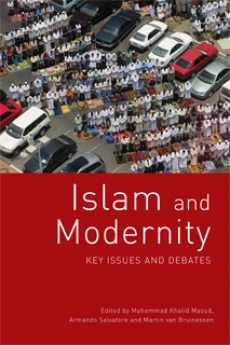
Islam and Modernity: Key Issues and Debates
The idea of the present book emerged in 2002 when the editors began developing a postgraduate course on Islam and modernity at the International Institute for the Study of Islam in the Modern World (ISIM) in Leiden, The Netherlands. Our aim was to engage with Western social thought as well as with the ideas and visions of nineteenth- and twentieth-century thinkers in the Muslim world concerning the political, socio-economic and cultural transformation of their societies. We found that there was no single book we could use to introduce the range of subjects that we thought essential for such a course. The scholarly literature on various aspects of Islam and modernity is rich and complex and rapidly expanding, but there is a dearth of general works that offer an interdisciplinary perspective and overview of the major questions and debates in this literature. We convened a workshop at ISIM on ‘Islam and Modernity, Key Issues and Debates’ in October 2004. The present book is an outcome of continued deliberations and revisions of the papers presented at the workshop.
The book aims to provide refl ections on major debates that have taken place within and between the various scholarly disciplines that have addressed questions of modernity in connection with Islam and Muslim societies. The book is organised in three parts. The fi rst part, ‘Conceptualising Modernity’, consists of two chapters that introduce theoretical and general issues in modernity studies. The four chapters in the second part, ‘Negotiating Modernity’, offer an analysis of the processes of modernisation of Muslim societies, focusing on certain specific aspects of their social and political dynamics. The four chapters in the third part, ‘Debating Modernity’, survey how Muslim scholars and intellectuals have perceived and responded to issues of modernity. The contributors to the book are drawn from among the best-known scholars in the fi eld, whose earlier work we found most seminal and stimulating in our teaching.
|